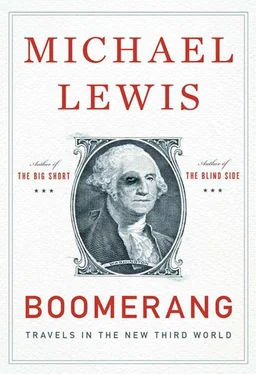He came into office with boundless faith in the American people—after all, they had elected him—and figured he could always appeal directly to them. That was his trump card, and he played it. In November 2005 he called a special election that sought votes on four reforms: limiting state spending, putting an end to the gerrymandering of legislative districts, limiting public employee union spending on elections, and lengthening the time it took for public school teachers to get tenure. All four propositions addressed, directly or indirectly, the state’s large and growing financial mess. All four were defeated; the votes weren’t even close. From then until the end of his time in office he was effectively gelded: the legislators now knew that the people who had elected them to behave exactly the way they were already behaving were not going to undermine them when appealed to directly. The people of California might be irresponsible, but at least they were consistent.
A compelling book called California Crackup describes this problem more generally. It’s written by a pair of journalists and nonpartisan think tank scholars, Joe Mathews and Mark Paul, and they explain, among other things, why Arnold Schwarzenegger’s experience as governor was going to be unlike any other experience in his career: he was never going to win. California had organized itself, not accidentally, into highly partisan legislative districts. It elected highly partisan people to office and then required these people to reach a two-thirds majority to enact any new tax or meddle with big spending decisions. On the off chance that they found some common ground, it could be pulled out from under them by voters through the initiative process. Throw in term limits—no elected official now serves in California government long enough to fully understand it—and you have a recipe for generating maximum contempt for elected officials. Politicians are elected to get things done and are prevented by the system from doing it, leading the people to grow even more disgusted with them. “The vicious cycle of contempt,” as Mark Paul calls it. California state government was designed mainly to maximize the likelihood that voters will continue to despise the people they elect.
But when you look below the surface, he adds, the system is actually very good at giving Californians what they want. “What all the polls show,” says Paul, “is that people want services and not to pay for them. And that’s exactly what they have now got.” As much as they claimed to despise their government, the citizens of California shared its defining trait: a need for debt. The average Californian, in 2011, had debts of $78,000 against an income of $43,000. The behavior was unsustainable, but, in its way, for the people, it works brilliantly. For their leaders, even in the short term, it works less well. They ride into office on great false hopes and quickly discover they can do nothing to justify those hopes.
In Paul’s view, Arnold Schwarzenegger had been the best test to date of the notion that the problem with California politics was personal; that all the system needed to fix itself was an independent-minded leader willing to rise above petty politics and exert the will of the people. “The recall was, in and of itself, an effort by the people to say that a new governor—a different person—could solve the problem,” says Paul. “He tried every different way of dealing with the crisis in services. He tried to act like a Republican. He tried to act like a Democrat. He tried making nice with the legislature. When that didn’t work he called them girlie men. When that didn’t work he went directly to the people. And the people voted against his proposals.”
The experiment hadn’t been a complete failure. As governor, Schwarzenegger was able to accomplish a few important things—reforming worker compensation, enabling open primaries, and, at the very end, ensuring that legislative districts would be drawn by an impartial committee rather than by the legislature. But on most issues, and on virtually everything having to do with how the state raised and spent money, he lost. In his first term Schwarzenegger had set out to cut spending and found he could cut only the things that the state actually needed. Near the end of his second term, he managed to pass a slight tax increase, after he talked four Republicans into creating the supermajority necessary for doing so. Every one of them lost his seat in the next election. He’d taken office in 2003 with approval ratings pushing 70 percent and what appeared to be a mandate to fix California’s money problems; he’d left in 2011 with approval ratings below 25 percent, having fixed very little. “I was operating under the common sense kind of thing,” he says now. “It was the voters who recalled Gray Davis. It was the voters who elected me. So it will be the voters who hand me the tools to do the job. But the other side was successful enough for the voters to take the tools away.”
David Crane, his economic adviser—at that moment, rapidly receding into the distance—could itemize the result: a long list of depressing government financial statistics. The pensions of state employees ate up twice as much of the budget when Schwarzenegger left office as they did when he arrived, for instance. The officially recognized gap between what the state would owe its workers and what it had on hand to pay them was roughly $105 billion, but that, thanks to accounting gimmicks, was probably only about half the real number. “This year the state will directly spend thirty-two billion dollars on employee pay and benefits, up sixty-five percent over the past ten years,” says Crane later. “Compare that to state spending on higher education [down 5 percent], health and human services [up just 5 percent], and parks and recreation [flat], all crowded out in large part by fast-rising employment costs.” Crane was a lifelong Democrat with no particular hostility to government. But the more he’d looked into the details, the more shocking he found them to be. In 2010, for instance, the state spent $6 billion on fewer than 30,000 guards and other prison system employees. A prison guard who started his career at the age of forty-five could retire after five years with a pension that very nearly equaled his former salary. The head parole psychiatrist for the California prison system was California’s highest-paid public employee; in 2010 he’d made $838,706. The same fiscal year that the state spent $6 billion on prisons, it had invested just $4.7 billion in its higher education—that is, 33 campuses with 670,000 students. Over the past thirty years the state’s share of the budget for the University of California had fallen from 30 percent to 11 percent, and it was about to fall a lot more. In 1980 a Cal student paid $776 a year in tuition; in 2011 he would pay $13,218. Everywhere you turned, the long-term future of the state was being sacrificed.
This same set of facts, and the narrative it suggested, would throw an ordinary man into depression. He might conclude that he lived in a society that was ungovernable. After seven years of trying and mostly failing to run California, Schwarzenegger is persuasively not depressed. “You have to realize the thing was so much fun!” he says. “We had a great time! There were times of frustration. There were times of disappointment. But if you want to live rather than just exist, you want the drama.” As we roll to a stop very near the place on the beach where he began his American bodybuilding career, he says, “You have to step back and say, ‘I was elected under odd circumstances. And I’m going out in odd circumstances.’ You can’t have it both ways. You can’t be a spoiled brat.”
The odd circumstances were the never-ending financial crises. He’d come to power in the bust after the Internet bubble; he’d left in the bust after the housing bubble. Before and after our bike ride, I had sat down with him to get his view of this second event. It was in the middle of 2007, he said, when he first noticed something was not quite right in the California economy. He’d been finishing up budget negotiations and arrived at a number, however phony, where the budget could be declared balanced. An aide walked into his office to give him a heads-up: the tax receipts for that month were less than expected. “We were all of a sudden short three hundred million dollars in revenue for the month,” says Schwarzenegger. “I somehow felt, Uh-oh. Because there was something in the air.” Soon after that he visited the George W. Bush White House, where he gave a talk that was, as ever, upbeat. “At the end of it this guy—he was the guy who was in charge of housing, I forgot the name. Great guy. For some reason or other he was very honest with me. I don’t know why. He probably didn’t think I’d go out and blab, which I didn’t. He says, ‘That was a great speech you gave, but we’re heading to a major problem.’ I said, ‘What do you mean?’ He said, ‘I looked at some of the numbers, and it’s going to be ugly.’ That’s all he said. He wouldn’t elaborate.” A housing price decline in the United States meant a housing price collapse in California; and a housing price collapse in California meant an economic collapse, and a decline in tax revenues. “The next month our revenues came in short six hundred million dollars. By December we were short a billion.”
Читать дальше












